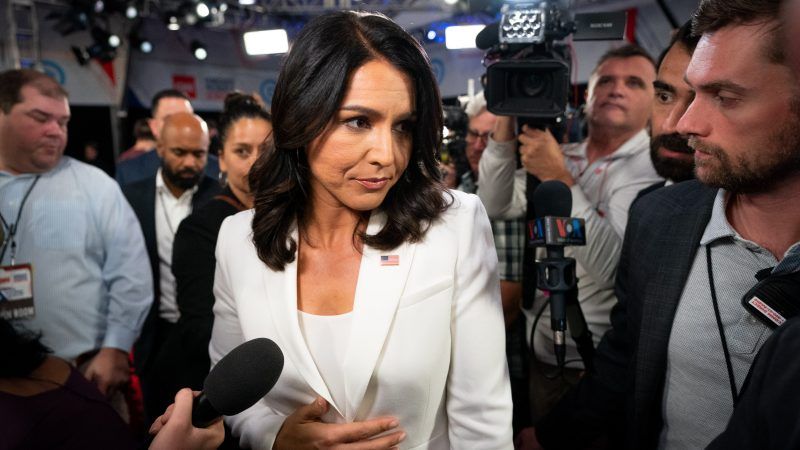Tulsi Gabbard Files Defamation Lawsuit Against Hillary Clinton Over 'Russian Asset' Comments
The lawsuit might be good politics, but it's bad for free speech.

Dark horse presidential candidate Rep. Tulsi Gabbard (D–Hawaii) has filed an eyebrow-raising lawsuit against Hillary Clinton for defamation over comments the former Secretary of State made on a podcast suggesting that Gabbard was a Russian stooge.
The lawsuit, filed Wednesday morning in the U.S. District Court for the Southern District of New York claims that Clinton's comments have damaged Gabbard and democracy itself.
"Clinton had no basis for making her false assertions about Tulsi—and indeed, there is no factual basis for Clinton's conspiracy theory," reads Gabbard's complaint. "Tulsi brings this lawsuit to ensure that the truth prevails and to ensure this country's political elites are held accountable for intentionally trying to distort the truth in the midst of a critical Presidential election."
In October 2019, Clinton appeared on the podcast Campaign HQ, where she, while not mentioning Gabbard by name, implied that the Hawaiian representative was being "groomed" by the Republicans to launch a disruptive third-party bid, something that would apparently delight the Russian government.
"She's the favorite of the Russians. They have a bunch of sites and bots and other ways of supporting her so far. And, that's assuming [2016 Green Party candidate] Jill Stein will give it up, which she might not because she's also a Russian asset. Yeah, she's a Russian asset," said Clinton on the podcast.
When asked the following day if these comments were about Gabbard, a Clinton spokesperson said, "If the nesting doll fits."
In November, Gabbard sent a letter to Clinton threatening her with a defamation suit unless she retracted her comments. With no retraction forthcoming, Gabbard is making good on her threat.
Her lawsuit asks that Clinton be made to pay damages, and, incredibly, that the court issue an injunction prohibiting the "publication or republication" of Clinton's Russian asset comments.
This is not the first unconventional lawsuit filed by Gabbard during her presidential campaign. She also sued Google for violating her First Amendment rights after the company briefly suspending her Google Ads account following a July Democratic debate.
Obviously the First Amendment's free speech protections don't restrict the actions of private corporations. Gabbard's Google lawsuit, Reason's Billy Binion noted at the time, was more about capitalizing on anti-Big Tech animus than making substantive legal claims.
The presidential contender's lawsuit against Clinton similarly seems to be motivated by political considerations.
Gabbard has made opposition to U.S. interventionism—and the support it has among Clinton-style Democrats—the signature issue of her campaign. Her lawsuit gives her an opportunity to throw some spicy disses in that direction.
Gabbard, her lawsuit notes, is running for the same office that Clinton "has long coveted, but has not been able to attain." The 2016 Democratic nominee is also referred to as "a cutthroat politician by any account." (Tell us how you really feel, Tulsi!)
Ironically, for all the injury that she is claiming, Gabbard actually saw a poll bump after Clinton's remarks. That's because all publicity is good publicity when you are running a long shot campaign for president. Clinton's comments got Gabbard's name in the news, increasing her visibility to voters. The lawsuit seems like a calculated attempt to replicate that result.
Whether her lawsuit has any legal merit is something the courts will have to decide, a decision that will turn in part on whether Clinton was making a factual assertion, or if she was engaging in good old-fashioned political hyperbole.
Regardless of how the legal battle shakes out, one politician suing another over their rhetoric is not healthy. Democracy requires that people can say nasty, even untrue, things about their opponents and rivals without the fear of being dragged into court.
Should that become the norm, courts (not voters) will decide the acceptable parameters of political speech and debate.
Rent Free is a weekly newsletter from Christian Britschgi on urbanism and the fight for less regulation, more housing, more property rights, and more freedom in America's cities.
Show Comments (170)